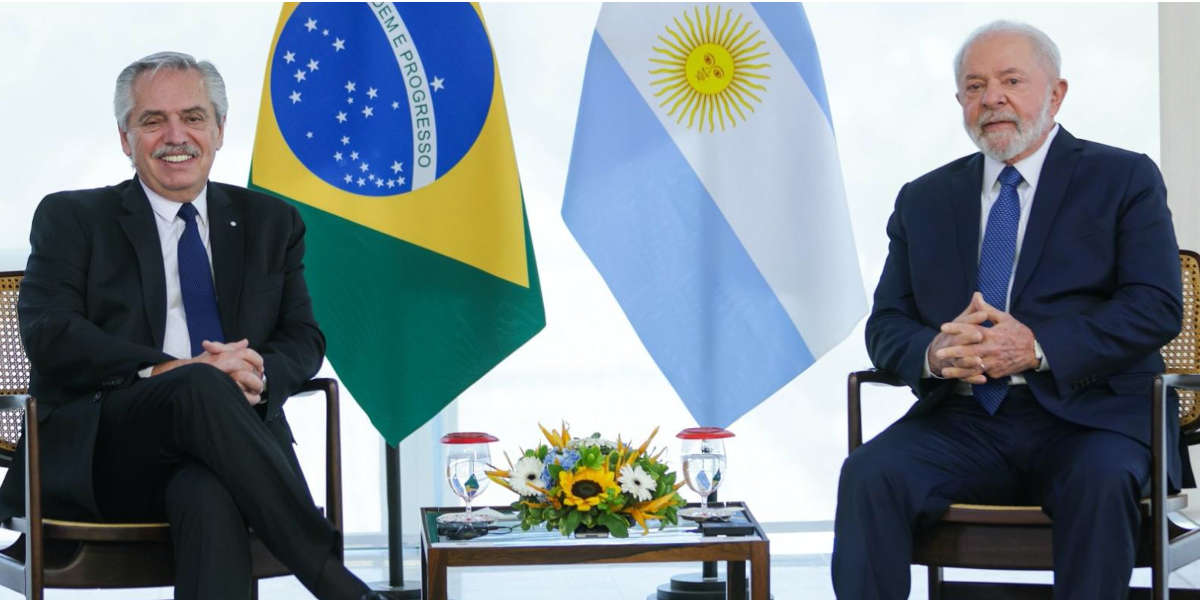In the picture
Alberto Fernández and Lula da Silva, in June 2023 [Gov. of Argentina].
The invitation to Argentina to join group BRICS, in a first expansion of this forum that includes China, Russia and India, in addition to Brazil and South Africa, raises the question of Brazil's interest in its largest neighbor becoming part of an entity that until now has given special singularity to Brazil. Beijing has promoted the entrance of six new members (Saudi Arabia, Emirates, Egypt, Ethiopia, Iran and Argentina) as an attempt to promote alternatives to a West led by the United States and Europe. Neither India nor Brazil were enthusiastic about the enlargement, as it diminishes their prominence, but Brasilia nevertheless gains some advantages.
The advertisement of Argentina's incorporation to the group BRICS has motivated a discussion about what effects this incorporation may have for Argentines - supposed economic gain, on the one hand, or complication due to an excessive global alignment with China and Russia, on the other - and how likely it is that such advertisement will translate into an effective incorporation, especially considering the presidential election process underway.
Here, on the other hand, we examine the interests Brazil may have in Argentina's incorporation. Economics These interests can be summarized in four cardinal points, all of them interrelated: (i) to reinforce Brazilian leadership in the region; (ii) to guarantee the permanence of an ideological ally in the Argentine presidency; (iii) to ensure the economic and political stability of the second largest country in the region; and (iv) to increase Latin America's participation and role in important international forums.
1. Strengthening Brazilian leadership in the region
Brazil already enjoys a leading position in Latin America, both in economic and commercial terms, as well as in security and diplomacy. The incorporation of Argentina into BRICS would reinforce this position, especially given the intermediation work that former Brazilian President Dilma Rousseff and current President Lula da Silva have carried out in favor of Argentina once the Chinese desire to proceed with an enlargement was confirmed. It is clear that even if Argentina's entrance does not become effective in the end, Brazil's role will have been more than relevant in the management and will open the way to lead the hypothetical entrance of other countries in the region in the group.
This leadership is especially relevant in the case at hand, since Argentina is partner the main partner of Brazil in all aspects. And it is seconded by other interests, if you will, of lesser importance advertising. Among them, the construction of the President Néstor Kirchner Gas Pipeline, which will connect the Vaca Muerta field with Buenos Aires and whose first section is already in operation. reservation Brazil will want to benefit from this field, where the world's second largest gas field and the fourth largest oil field are located, at an affordable price, which will be helped by Argentina's entrance in BRICS and the intermediary work already carried out by Brasilia.
This is better understood, moreover, in light of the de-dollarization goal that Brazil has been pursuing for some time. Whether it happens or not, the entrance of Argentina in BRICS could encourage trade with Brazil and with the rest of the partners in currencies other than the dollar (in Brazilian real with Brazil or in yuan with all members), while allowing Argentina to reduce the dependence on the IMF that its economic status imposes on it.
2. Ensuring an ideological ally in the Argentinean presidency
As already mentioned, this October Argentina holds presidential and legislative elections in Argentina, with a foreseeable second round in November. There are many who point to a victory of the right wing over the Peronism of Unión por la Patria, headed by Sergio Massa, now minister of Economics. The victory of the civil service examination would probably entail the refusal of Argentina's incorporation to group and even, although unlikely, the breaking of trade relations with the Asian giant (and with Brazil, in the words of candidate Javier Milei). Lula hopes that the diplomatic success of the incorporation to group BRICS will help Peronism electorally; however, the formal incorporation would not be until January 1, 2024.
Together with Argentina's privileged commercial role as partner for Brazil, it is evident that the ideological closeness between Lula and Fernandez has contributed to the former's diplomatic work with China and could contribute, if Peronism finally wins the elections, to the progress of both countries within that forum. In this sense, in June both states signed the Action Plan for the Relaunching of the Strategic Relationship, the implementation of which would facilitate the ideological alignment of both governments.


